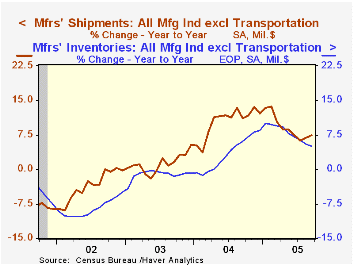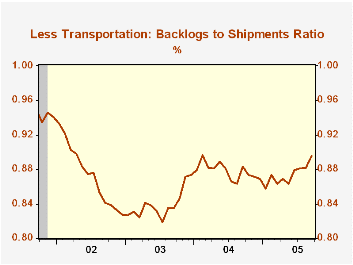 Global| Nov 03 2005
Global| Nov 03 2005U.S. Factory Inventories Slip
by:Tom Moeller
|in:Economy in Brief
Summary
Factory inventories fell another 0.1% in September following a deepened 0.2% decline in August even though higher prices recently have boosted petroleum inventories, (+24.9% y/y). Less petroleum, factory inventories fell 0.1% (+4.1% [...]

Factory inventories fell another 0.1% in September following a deepened 0.2% decline in August even though higher prices recently have boosted petroleum inventories, (+24.9% y/y). Less petroleum, factory inventories fell 0.1% (+4.1% y/y) in September for the third decline in the last four months and have been virtually unchanged since March.
Inventory declines last month centered mostly in nondurables industries where textile products fell 0.9% (-0.1% y/y) and paper products fell 0.8% (+2.5% y/y). Plastics & rubber products also fell a sharp 1.8% (+6.4% y/y) and paints & coatings inventories fell 1.0% (+6.3% y/y).
Electrical equipment inventories rose 1.0% (3.2% y/y) after four months of declines while machinery inventories rose 0.2% (9.3% y/y). Computers & electronic components rose 0.1% (-0.3% y/y) but electronic computer inventories rose 4.4% (0.9% y/y).
Factory shipments fell 0.5% after an upwardly revised 2.1% surge in August, however, less a 3.4% jump in shipments from petroleum refineries factory shipments fell 0.9% (3.9% y/y).
Factory sector orders fell 1.7%. The advance report of a 2.1% drop in durables goods orders was revised to -2.4%.
Unfilled orders jumped 0.7% on top of the 1.6% August spurt. Less the transportation sector backlogs surged 1.2% (8.9% y/y) and the ratio of unfilled orders to shipments jumped.
| Factory Survey (NAICS) | Sept | Aug | Y/Y | 2004 | 2003 | 2002 |
|---|---|---|---|---|---|---|
| Inventories | -0.1% | -0.2% | 4.9% | 7.7% | -1.1% | -5.4% |
| New Orders | -1.7% | 2.9% | 7.0% | 9.3% | 3.5% | -2.5% |
| Shipments | -0.5% | 2.1% | 6.6% | 9.5% | 1.5% | -2.5% |
| Unfilled Orders | 0.7% | 1.6% | 10.4% | 8.4% | 8.0% | -8.5% |
Tom Moeller
AuthorMore in Author Profile »Prior to joining Haver Analytics in 2000, Mr. Moeller worked as the Economist at Chancellor Capital Management from 1985 to 1999. There, he developed comprehensive economic forecasts and interpreted economic data for equity and fixed income portfolio managers. Also at Chancellor, Mr. Moeller worked as an equity analyst and was responsible for researching and rating companies in the economically sensitive automobile and housing industries for investment in Chancellor’s equity portfolio. Prior to joining Chancellor, Mr. Moeller was an Economist at Citibank from 1979 to 1984. He also analyzed pricing behavior in the metals industry for the Council on Wage and Price Stability in Washington, D.C. In 1999, Mr. Moeller received the award for most accurate forecast from the Forecasters' Club of New York. From 1990 to 1992 he was President of the New York Association for Business Economists. Mr. Moeller earned an M.B.A. in Finance from Fordham University, where he graduated in 1987. He holds a Bachelor of Arts in Economics from George Washington University.
More Economy in Brief
 Global| Feb 05 2026
Global| Feb 05 2026Charts of the Week: Balanced Policy, Resilient Data and AI Narratives
by:Andrew Cates






